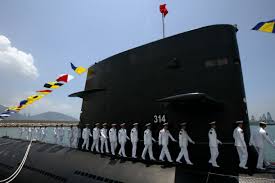
A new Chinese nuclear-powered attack submarine reportedly sunk while still under construction earlier this year. This incident has raised significant concerns about the People’s Liberation Army Navy (PLAN) and its internal accountability. A senior U.S. defense official revealed that China attempted to conceal the submarine’s sinking, which took place next to a pier.
The Wall Street Journal first reported the incident, citing satellite imagery that showed cranes deployed for salvage operations. This imagery suggests that the Chinese military was aware of the situation but chose to downplay its severity. Consequently, the sinking of the submarine, identified as China’s first Zhou-class vessel, has sparked a flurry of questions regarding the training standards and operational safety within the Chinese Navy.
Many experts believe that the Zhou-class submarine, as China’s first domestically designed and built nuclear-powered attack submarine, was meant to enhance China’s naval capabilities and assert its influence in regional waters. However, the sinking raises severe doubts about the effectiveness of the construction and quality control processes within China’s defense industry. Furthermore, it indicates potential flaws in managing high-stakes projects critical to national security.
In addition, this incident could have broader implications for China’s military ambitions. The PLAN has been rapidly expanding its fleet, aiming to establish itself as a dominant maritime force. Yet, such a dramatic failure during a critical asset’s construction phase suggests that deeper issues may be at play. It raises questions about personnel training and the overall readiness of the Navy to handle complex operations.
Moreover, this incident is not isolated. Concerns have been growing regarding the transparency and accountability within China’s military establishment. The government’s efforts to cover up the sinking may reflect a reluctance to acknowledge shortcomings or failures in its military projects. As a result, this could undermine trust among both military personnel and the public.
Transitioning to the implications of this event, analysts believe that the sinking could impact China’s future military endeavors. Addressing safety and accountability issues may help develop more advanced naval assets. Additionally, foreign observers may question the reliability of China’s military capabilities, which could influence regional power dynamics. This incident could potentially slow down China’s naval expansion and embolden other countries to challenge its dominance in the South China Sea.
Furthermore, the incident has caught the attention of international defense communities. Many countries closely monitor China’s military developments, especially in the South China Sea, where tensions have escalated. The sinking of a high-profile submarine might embolden rivals to challenge China’s claims and assert their presence in contested waters. It could also lead to increased scrutiny and criticism from other global powers, potentially affecting China’s international relations.
The sinking of China’s first Zhou-class nuclear-powered attack submarine during construction highlights significant challenges within the People’s Liberation Army Navy. Concerns about training standards and internal accountability surface, and this incident raises serious questions about the future of China’s naval ambitions. As the country continues to pursue its military objectives, it must address these issues to ensure the effectiveness and safety of its operations.



